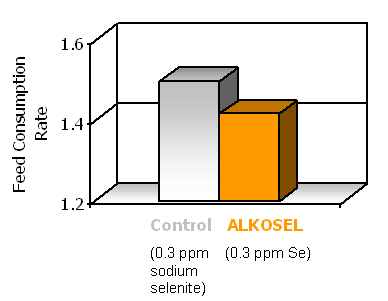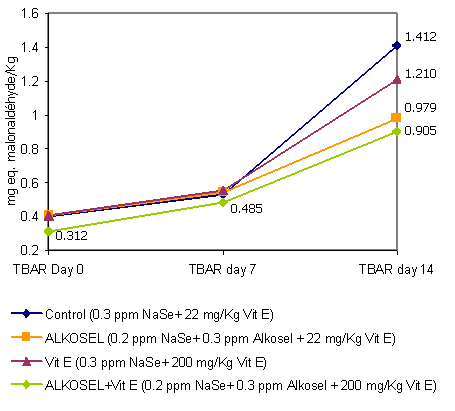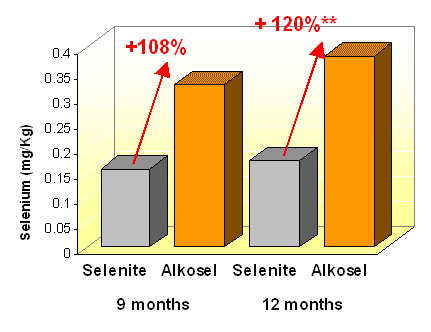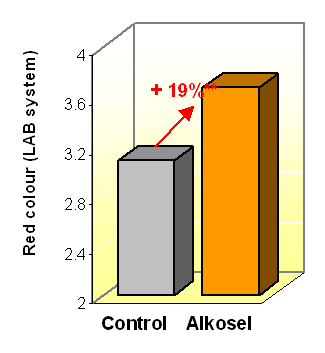Benefits of selenium yeast in pig production
Ghislaine Roch, independent feed nutritionist in Canada, has been working on antioxidants in animal production for more than ten years. She is convinced that modern animal production practices, with their associated stress factors and high metabolism, increase oxidative stress, leading to loss of performance, fertility and health problems for the animal, as well as decreased meat quality.
She presented several large-scale trials assessing the impact of Alkosel®R397 supplementation vs. inorganic selenium on pig performance and meat quality under commercial conditions.
Nursery trial: improved feed efficacy
This large-scale trial involved 45,800 piglets (7 weeks in nursery and 12 weeks in grower/finisher). While the selenium form had no effect on the piglets average weight gain but feed conversion rate was improved by -5.5% with Alkosel®R397, compared to selenite, resulting in extra revenue for the farmer (+ 0.36 €/piglet).
Graph 1: Effect of Alkosel®R397 on feed conversion rate, compared to inorganic selenium source
Improved meat quality
Meat selenium content can be an important nutritive criterion, considering that most part of the world population is selenodeficient.
A study, designed to measure the effect of antioxidants supplementation on meat quality was performed in Chile. The trial involved about 5000 pigs, divided between four groups (Control, Vitamin E, Alkosel®R397, Alkosel®R397+ Vitamin E), from day 70 to slaughter.
Alkosel®R397 supplementation lead to a 273% increase in meat selenium content. 
Graph 2: Effect of antioxidants supplementation on meat oxidation
When looking at meat oxidation, Alkosel®R397 supplementation, alone or with 200 mg/Kg of Vitamin E, gave the best results, compared to Sodium Selenite, reducing meat oxidation rate by close to 30%, likely to result in longer shelf life.
Another trial, performed in Belgium, on a smaller scale, revealed a 65% decrease in the meat oxidation rate with Alkosel®R397 supplementation, vs. selenite.
A French trial, performed with Bayonne Ham producers, was conducted to assess the effect of Alkosel®R397 supplementation, vs. selenite on ham quality and selenium content.
The investigators concluded to a positive effect of Alkosel®R397 supplementation on the matured ham selenium content (over 100% increase), but also the lean ham red color, an important quality criterion in the label charter. The mature ham fat layer was also significantly reduced, while the ham physico-chemical (humidity, fat content, fatty acids profile, proteins content…) and sensitive characteristics were not affected.

Graphs 3-4: Bayonne Ham trial: Alkosel®397 supplementation improved selenium content and appearance of mature ham (**P<0.01)
|
In conclusion, the use of selenium yeast in pig production appears a good solution to reduce the impact of stress in animals. It is also profitable for the producer, allowing increasing feed value and adding value to his production with the development of the functional food market. By participating in solving a public health issue, could selenium-enriched meat support the development of the pig market?
Key points:
- Stress factors linked to modern production practices lead to oxidative stress in swine.
- Organic selenium (selenium yeast) is more bioavailable than inorganic selenium.
- Selenium yeast supplementation improves feed efficacy in production conditions.
- Selenium yeast supplementation improves meat quality and meat selenium content.





.jpg&w=3840&q=75)